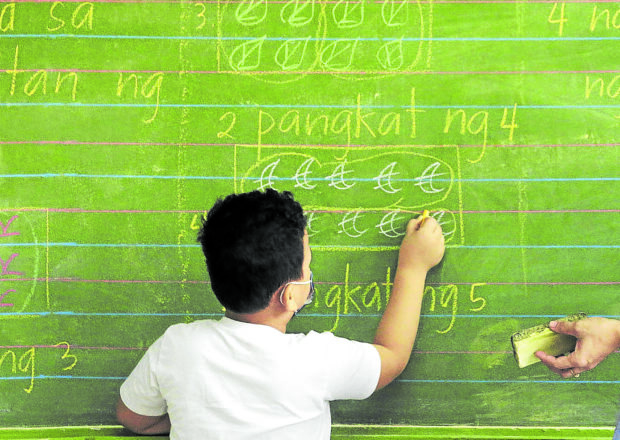
A teacher and her students learn together at the Pedro Cruz Elementary School in San Juan City as it reopened its face-to-face classes on Thursday, February 10, 2022. The school passed the DepED Schools Safety Assessment Tool (SSAT) which shows its readiness for the limited face-to-face learning modality. (File photo by GRIG C. MONTEGRANDE / Philippine Daily Inquirer)
MANILA, Philippines — Elementary and high school students in private schools nationwide suffered learning losses in mathematics and science because of disruptions to their studies caused by the COVID-19 pandemic, according to the results of a recent study.
In the first Philippine Assessment for Learning Loss Solutions (PALLS) conducted by the University of San Carlos (USC) and Thames International School, a total of 3,600 Grades 1 to 12 students from 18 private schools all over the country posted an average test score of 54.1 percent in science and 47.5 percent in math.
Both scores were well below the 60-percent passing grade set by the Department of Education.
In English, the participants in the study barely passed with an average score of 61.5 percent.
Based on the results, the study recommended several solutions and interventions, including the conduct of a periodic and granular assessment of students’ skills; remediation programs with technology, television and online support; teacher upskilling; and tutor recruitment and training.
‘Essential competencies’
Fr. Narciso Cellan Jr., USC president, pointed out that if the learning losses were not addressed “collectively, systematically and urgently,” these would result in huge productivity losses and “costly” economic consequences.
The PALLS is an online academic assessment tool crafted by the USC to measure the extent of learning loss in the country brought about by school closures due to the pandemic.
Richard Jugar, dean of the USC School of Education, said the nationwide assessment conducted in the last quarter of 2022 was based on the “most essential learning competencies” in science, mathematics and English.
The students were asked to answer 75 multiple-choice questions for the three core subjects of their previous grade levels.
‘Upper grade levels’
Aside from learning losses in math and science, the results also showed that the average assessment scores of students decreased as the grade level progressed, “indicating a more severe effect for learners in Grades 4 to 12.”
“The older the student, the lower the result ,… the magnitude of learning loss is much higher at the upper grade levels,” Jugar said during the presentation of the study to the Catholic Educational Association of the Philippines on March 8.
Citing the Glossary of Education Reform, Jugar said that learning losses refer to “any specific or general loss of knowledge and skills or to reversals in academic progress, most commonly due to extended gaps or discontinuities in a student’s education.”
First step to recovery
In their study, USC and Thames adopted the framework used by the Asian Development Bank (ADB) in its brief published in July 2022, which indicated that “recovery should start with testing students” to determine the severity of learning loss.
“Knowing the degree of learning loss will guide teachers on where to restart lessons as schools reopen. It will also act as a baseline for policymakers to evaluate the impact of learning recovery policies,” the ADB said.
Joel Santos, president of Thames, said the assessment was the “first step toward solving the problem of learning loss.”
“We hope the indicative data from PALLS provide directions not only to our school leaders but also to policymakers so that interventions can be done to help our Filipino students,” he added.

